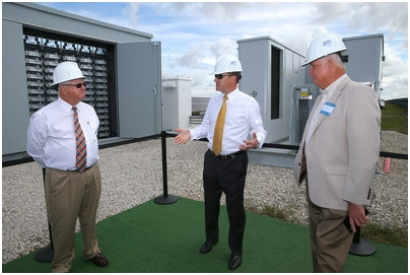
By incorporating this new technology into the FPL Citrus Solar Energy Center, a solar power plant that was built in 2016, FPL expects to increase the amount of solar energy that the plant can deliver to the electric grid by more than 500,000 KWh a year.
The new system features a 4,000-KW/16,000-KWh storage capacity comprised of multiple batteries integrated into the operations of the FPL Citrus Solar Energy Center. In addition to enabling the plant to provide more solar energy to the grid, the battery system is capable of storing the energy and dispatching it to the grid at a later time.
This technology has the potential to improve the predictability of solar energy, which naturally fluctuates with the sun's availability. Increased predictability enables FPL to more efficiently dispatch other power plants, helping save customers on fuel costs.
The FPL Citrus Solar Energy Center is one of three solar plants FPL operates in Florida's DeSoto County – a community that boasts more solar panels than residents. In addition to the FPL Citrus Solar Energy Center, DeSoto County is home to Florida's first solar power plant, the 25-MW FPL DeSoto Next Generation Clean Energy Center, which was the largest of its kind in the nation when it was built in 2009, and the 74.5-MW FPL Wildflower Solar Energy Center, which entered service on Jan. 1, 2018.
The new solar-plus-storage system is the first large-scale application of "DC-coupled" batteries at a solar power plant in the U.S. It has the same advantages of other universal solar-plus-storage installations, such as the ability to store energy and dispatch it to the grid at a later time. A unique advantage of DC-coupled batteries is the ability to harness extra energy that a solar plant generates when the sun's rays are the strongest.
During these optimal operating periods, a solar plant may generate more power than its inverters can process, resulting in some energy inevitably being lost – or "clipped" by the inverter. Unlike other batteries, a DC-coupled system can capture this extra clipped energy, thereby increasing the amount of energy the plant delivers to the grid.
For several years, FPL and other NextEra Energy companies have been researching and testing battery-storage technologies to study a variety of potential benefits ranging from grid stabilization to improved solar integration. Currently, NextEra Energy companies operate approximately 130 MW of batteries with more than 100 MWh of storage capacity.
In 2016, FPL commissioned several battery-storage pilot projects to test different applications under real-world operating conditions. Systems are currently being tested at Everglades National Park's Flamingo Visitor Center, the Crandon Tennis Center on the island of Key Biscayne as well as other locations across south Florida. Learnings from these pilots are being applied to FPL's future plans.
For more information, visit www.FPL.com/solar.

